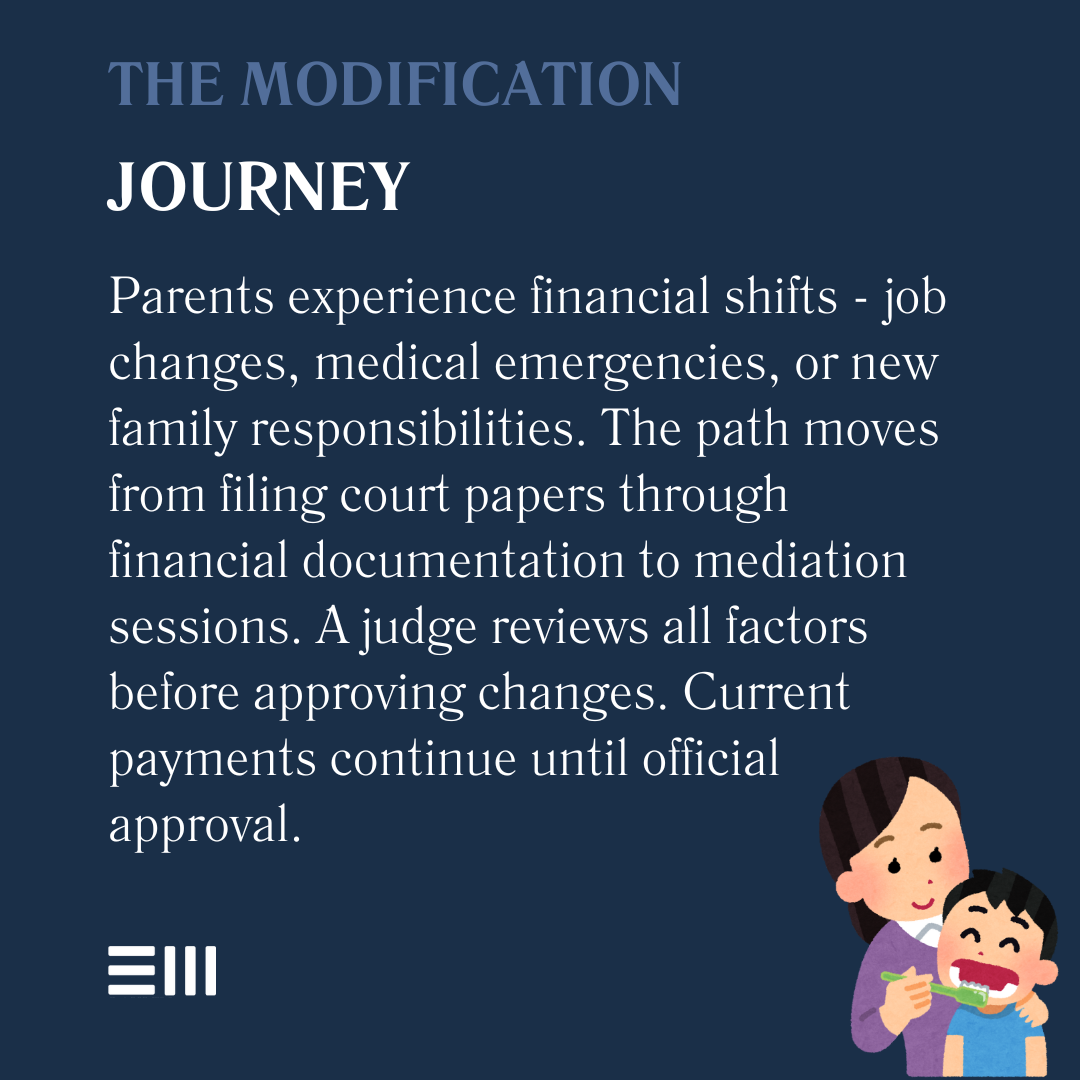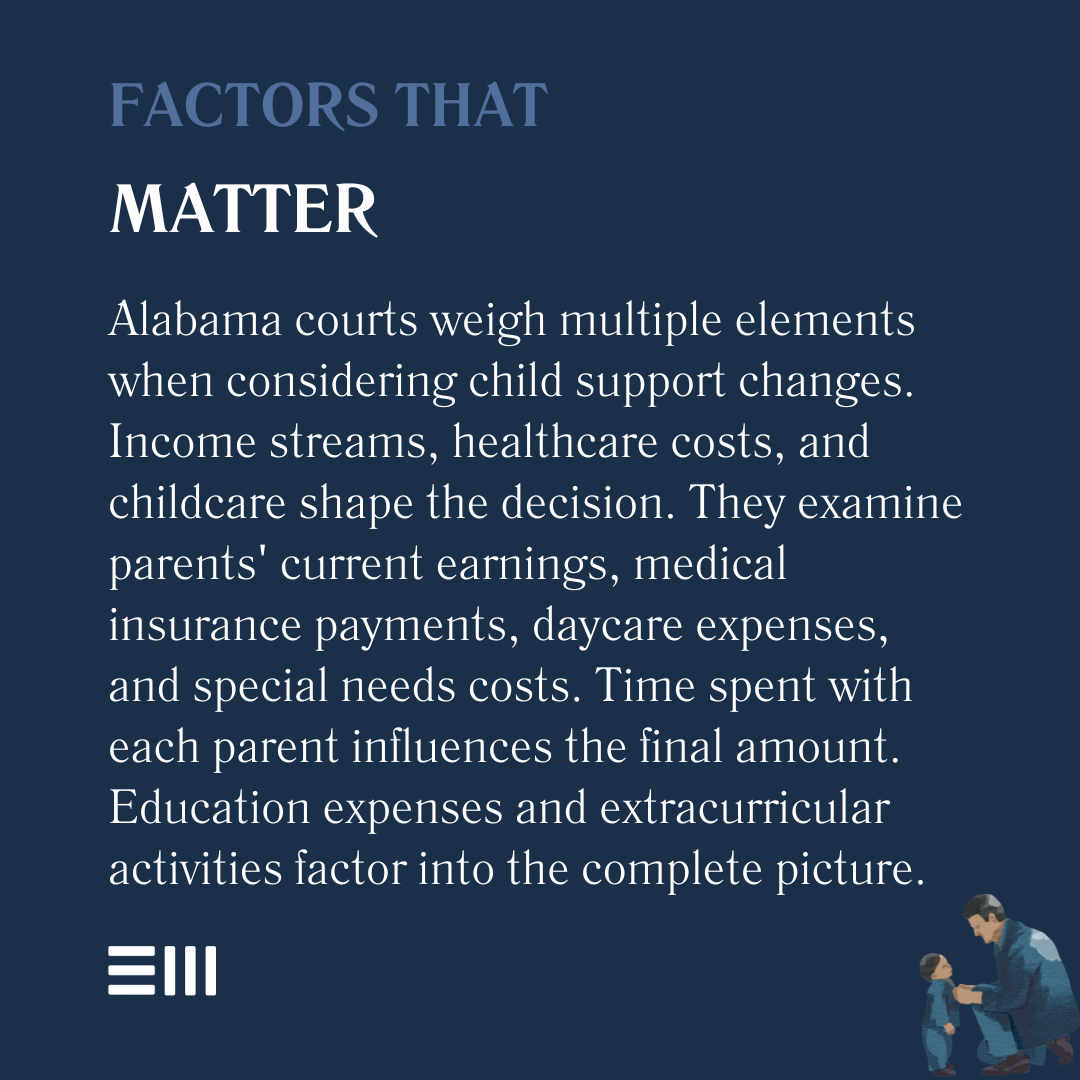Behind closed doors across Alabama, families face the daily challenge of making ends meet when child support arrangements no longer match their reality.
A lost job, a medical crisis, or a child's changing needs can transform a once-workable arrangement into an impossible burden.
The good news? Alabama's child support laws exist to help parents adapt to these changing circumstances.
Understanding Child Support Modifications
Life changes can significantly impact your ability to pay or receive child support.
Whether you're experiencing a job loss, income change, or new family responsibilities, Alabama law provides pathways to modify existing child support orders.
The state uses specific guidelines and calculations to determine appropriate support amounts, considering both parents' incomes and the children's needs.
When Can You Modify Child Support?
To modify child support in Alabama, you must demonstrate a "material change in circumstances." Understanding what qualifies as a material change helps you determine if modification is right for your situation.
Common qualifying changes include:
- Job loss or significant income changes;
- Medical emergencies or disabilities;
- Changes in the child's needs or education requirements;
- Remarriage affecting household income;
- Substantial increases in living costs;
- Changes in custody arrangements;
- Relocation impacting visitation costs;
- Significant changes in healthcare costs;
- Additional children from new relationships; and
- Changes in daycare expenses.
A court review may be warranted when the difference between the current order and the newly calculated amount exceeds 10%. After evaluating your circumstances, consult legal resources to determine if your situation meets the threshold for modification.
The Modification Process
The process of modifying child support involves several key steps that require careful attention and documentation. Understanding each phase helps ensure a smooth process.
Filing a petition with the court:
- Completing required forms;
- Gathering financial documentation; and
- Paying filing fees or requesting fee waiver.
Providing current financial documentation:
- Recent pay stubs;
- Tax returns;
- Bank statements; and
- Proof of other income sources.
Attending mediation (if required)
- Discussing proposed modifications;
- Negotiating terms; and
- Reaching potential agreements.
Participating in a court hearing
- Presenting evidence;
- Testifying about circumstances; and
- Answering questions from attorneys or judge.
Receiving the judge's final decision
- Understanding new payment terms;
- Implementing modified arrangements; and
- Setting up payment methods.
Remember that modifications are not automatic—you must continue paying the current amount until a new order is approved.
Important Considerations
Several factors influence child support modifications. Courts examine these elements comprehensively when evaluating modification requests:
- Regular employment;
- Overtime and bonuses;
- Self-employment earnings;
- Investment income; and
- Retirement benefits.
- Healthcare costs and insurance;
- Childcare expenses;
- Educational needs;
- Extracurricular activities; and
- Special needs or medical conditions.
- Other dependent obligations;
- Time-sharing arrangements;
- Transportation costs;
- Tax implications; and
- College expenses for older children.
These factors work together to create a complete picture of the family's financial situation and the children's needs.
Common Questions About Child Support Modifications in Alabama
Understanding child support modifications can be complex.
Here are answers to frequently asked questions to help guide you through the process.
How Long Does the Modification Process Take?
The timeline varies depending on court schedules and case complexity, typically ranging from 2-6 months. Factors affecting duration include court backlogs, cooperation between parties, and completeness of documentation.
Can I Modify Support Without Going to Court?
Parents can agree to modifications privately, but the changes must be approved by a judge to be legally binding. Even amicable agreements require court approval to ensure enforceability.
What if the Other Parent Refuses to Cooperate?
The court can proceed with modification hearings even if one parent is uncooperative. Both parties will have opportunities to present their cases, and the court may compel participation through various legal mechanisms.
Will Back Child Support be Modified?
Generally, modifications only affect future payments. Past-due amounts typically cannot be modified retroactively. This emphasizes the importance of filing for modification as soon as circumstances change.
How Often Can I Request Modifications?
While there's no strict limit, courts typically expect significant time between requests unless emergency circumstances arise. Frequent modification requests without substantial changes may be viewed unfavorably.
Do I Need an Attorney for Modification?
While not required, an attorney's guidance can be valuable, especially in complex cases involving multiple factors or contested modifications.
Taking Action for Your Children's Future
Life changes affecting child support can be stressful, but you don't have to navigate them alone.
Our experienced family law attorneys understand Alabama's child support laws and can help protect your children's financial security.
We'll guide you through each step of the modification process, ensuring your rights and your children's interests are protected.
Contact us today for a confidential consultation about your child support modification needs. Let us help you secure the fair support arrangement your children deserve.


